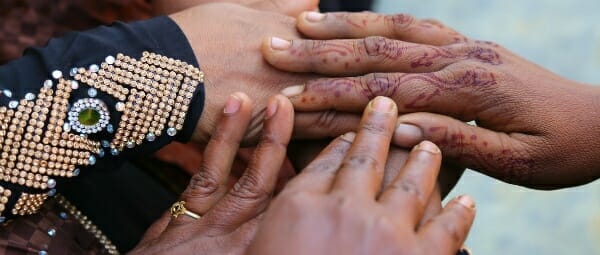An inconvenient truth – period.
This is so inconvenient. The last thing I want when I travel is my period.
Perhaps at the bottom on my list of places I would want to be when menstruating would be a hot and humid refugee camp in Bangladesh. Yet, this is exactly where I will be for a week. Along with packing my camera equipment, my dictaphone, my camp permit and my water bottle I also need to remember my tampons and some clean underwear so I don’t get ‘caught out’. However, the reality for me is only some minor disruptions to my daily routine. The reality for women living in the camps I am visiting is that their monthly period can cause much more distress.
On any given day, more than 800 million women between 15 and 49 have their period. Globally, 1.25 billion women do not have access to a toilet during menstruation (UN, 2017). In refugee camps, although supplies of underwear, soap, basins, safe toilets with locks and clean water are essential for women menstruating, these may not be seen as priorities. Women also often find it difficult to express their need for menstruation products, in what is already a stressful and alien environment.
Dignity is a multifaceted word that can mean different things to different people. The indignity caused by ‘period poverty’ in the UK has been a hot topic lately, where a spotlight has been on the unaffordability of sanitary towels and tampons for the poorest people in our society. In refugee camps in countries like Bangladesh, this problem is amplified further. Refugee camps are often perilous places for women and many in the camps have already experienced significant trauma. Having to find a way to ask for sanitary products is a daunting prospect and simple tasks like washing come fraught with worry.
When you first enter the Rohingya refugee camps of Cox’s Bazar in Bangladesh you hear the children and you see the men, but the absence of women is conspicuous. This is not because women are not there. Rohingya women and girls often live under restrictive socio-cultural norms where ‘modesty’ is associated with being inside the home. The violence most experienced or witnessed in Myanmar has made their movements even more restrictive. As with many refugee populations, the women are also at risk of gender-based violence, sexual exploitation and abuse within the crowded camps.
It is vital that women are consulted about their needs and are not sidelined in camp decisions. Having access to information, livelihood options and community activities is very important and the value of this inclusion becomes obvious when we consider the inconvenient truth of menstruation. It is key that women and girls are able to access menstrual products but also that they can feel safe in finding a place to wash. Having reusable and washable pads is a start, but only if there is a place women feel comfortable cleaning them. Additionally, in a refugee camp, being able to have a space where women’s’ hygiene can even be discussed, matters.
This week I am meeting with women and girls in what we call ‘Women’s Safe Spaces’, what many of the local women and girls call a ‘Shanti Khana’ (a place of peace). All We Can support these special spaces as they are not only spaces for counselling and socialisation, they are also spaces for information sharing and education. Spaces where it is ok for a girl to ask about getting her period. Spaces where women can sit and talk openly about difficult topics like menstruation.
All We Can have also supported work in the camps to create women’s bathing huts and toilets. Spaces that women can safely use while maintaining their dignity. When I use the toilet in the camps, I am forced to remember how often I take access to these basics for granted.
Having your period while travelling is inconvenient. There are no two ways about it. But, that is all it is for me, an inconvenience. However, for thousands of women worldwide, including the women and girls I am meeting this week, it is a monthly challenge amongst many other trials and tribulations that forced migration has pushed on to them.
You can still support Rohingya women and girls by giving to The Methodist Church and All We Can’s joint Rohingya Refugee Crisis Appeal
You can follow Laura and Revd Dr Barbara Glasson’s activities this week in Bangladesh on our social media channels @allwecanuk

